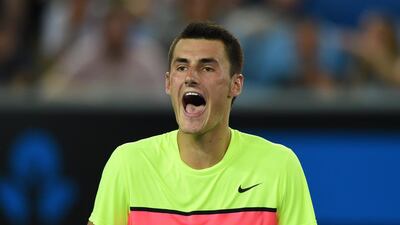Tennis Australia last week apologised for a typo in an email listing Bernard Tomic’s next tournament as the “Hall of Shame Tennis Championships”.
Thanks to the player’s most recent antics, though, that inadvertent “clerical” error now seems prophetic.
Already boasting a long list of misdemeanours, Tomic went ahead and added another unsavoury chapter – the Australian was arrested in Miami last week after a raucous party in his hotel room.
According to media reports, Tomic refused to turn down the volume in his penthouse despite repeated requests from the hotel security guards, who were then forced to order him to leave.
Tomic, 22, ignored those instructions and police had to be called in, but he refused to heed their call as well and had to be arrested, charged with resisting arrest and trespassing.
The incident has again highlighted two crucial faults in Tomic’s personality – his failure to heed well-meaning advice and his inability to understand what is good for him.
But probably the biggest problem is his refusal to comprehend the seriousness of his transgressions.
Tomic claimed he was “asleep on several occasions when they complained at first” as he offered an apology, but then dismissed the incident as “just a noise complaint”.
Yes, it was “just a noise complaint”, but his refusal to listen to the complaints led to his arrest and could hurt his chances of getting a US visa in the future.
He could have done without such an incident given the events over the previous two weeks.
Partying into the early hours of the morning a day after an embarrassing first-round, 6-3, 7-5 defeat to a world No 156 (compatriot John-Patrick Smith) and getting arrested for it, is not a great advertisement for his commitment to the sport.
Particularly so after Tennis Australia’s decision to dump him, the country’s highest-ranked player, from the Davis Cup team.
Questions over Tomic’s commitment are not new. He has been accused of tanking matches (remember his loss to Andy Roddick at the 2012 US Open?), and last year in Miami, he lost 6-0, 6-1 to Jarko Nieminen in what is, at 28 minutes and 20 seconds, the shortest match ever played on the ATP Tour.
Tomic has also been in trouble with the law before – when he got into a fight with a friend as they celebrated his 20th birthday at a spa and for speeding in his flashy cars (his licence was suspended once).
The youngest winner of the Australian Open Junior Boys’ Championships in the Open era (at age 15 in 2008), Tomic failed to mend his ways after those incidents and he is unlikely to change after this latest episode.
Even his supporters are running out of excuses. Tomic, clearly, is not a rebellious young Lleyton Hewitt or Roger Federer, but sadly more of a Mario Balotelli, hell bent on wasting his talent.
arizvi@thenational.ae
Follow us on twitter at @NatSportUAE

